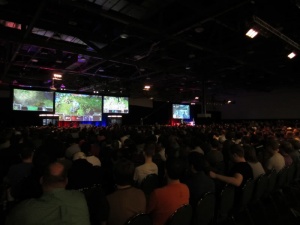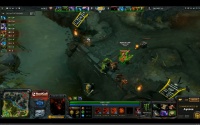Electronic Sports
Electronic sports (eSports) is the competitive play of video games. It is also referred to as competitive gaming, professional gaming, or cybersports. It is commonly associated with first-person shooter, real-time strategy, fighting, sports, racing, and massively-multiplayer online games. Commonly conducted in leagues and tournaments, eSports allows players to compete on an amateur, semi-professional, or professional level for cash prizes.[1]
Contents
Background
Multiplayer video games have been played competitively on a multitude of platforms. From the first arcade cabinets to current generation console systems such as Microsoft's Xbox 360 or Sony's Playstation 3, national and international tournaments have been hosted to showcase the best players as far back as 1980.[2]
The eSports community as a whole is represented by a variety of organizations, players and personalities dedicated to single or multiple eSports titles. In the arcade days, there was even a U.S. National Video Game Team comprised of the best arcade game players.[3] Modern organizations often have salaried players, much like actual sports teams, with several teams owning houses dedicated to player training and development. This is the most common in South Korea, often considered the mecca of eSports with the immense popularity of Starcraft: Brood War and Starcraft II, but is becoming more common with organizations in North America and Europe with the growing popularity of League of Legends.[4][5]
Both teams and major events also draw corporate sponsors looking to sell and market their product to target audiences. Major companies such as Intel, Coca-Cola, and Valve have sponsored both monetary and product prizes in recent events.[6][7] Such prizes have often amounted to millions of dollars per year, with the single largest prize to date totaling $2 million USD with the conclusion of the League of Legends Season 2 World Championship.[8]
Games
The following are a partial list of games (sorted by genre) previously or currently being played as major eSport titles in events, tournaments and leagues around the world.
First-person shooters
- Call of Duty (series)
- Halo (series)
- Counter Strike (Valve series)
- Quake (Id Software series)
- Team Fortress 2
Real-time strategy
- Starcraft: Brood War and Starcraft II (Blizzard Entertainment series)
- League of Legends
- Defense of the Ancients and DoTA 2 (Blizzard Entertainment/Valve series)
- Warcraft III
Fighting
- Street Fighter (series)
- Mortal Kombat (series)
- Tekken (series)
- Marvel vs. Capcom (series)
- Super Smash Bros (series)
- Various Japanese 2D fighters (Blazblue, King of Fighters series, Persona4Arena)
Sports
- FIFA (Soccer (20th Century) series)
- NCAA Football (Video Game Series)
Racing
- Trackmania (series)
Other
- Dance Dance Revolution (series)
- Guitar Hero (series)
- World of Warcraft
Events and leagues
There are several international large-scale annual events showcasing multiple eSport titles, including Major League Gaming, Intel Extreme Masters, Dreamhack LAN, Evolution Championship Series, the Electronic Sports World Cup, and World Cyber Games. The chosen titles often vary on an annual basis, and are either at the discretion of the organizers or voted on by the public.[9][10]
eSports also contains numerous online competitive leagues and ladders dedicated to eSport titles. These range from amateur leagues to semi-professional leagues and online qualifiers for places in live events.
Media coverage
eSports is primarily covered via the internet, where multiple online news outlets and communities report on the latest results, events, games and teams. There have also been appearances of eSports on major networks, with several countries also have television shows dedicated to eSports. Online viewership comes primarily from online streaming websites. Viewership has risen dramatically in recent years, with a recent Major League Gaming event drawing in 4.7 million viewers.[11]
Controversy and Ethical Implications
Game modification
While not as prolific in eSports due to the increased prevalence of anti-cheating software and administrators at live events, game modification software continues to be popular at the amateur and semi-professional level in online leagues. Often these cheats are bought or downloaded online through a third party company, or loaded through a flash drive or similar storage device at live events. The type of cheating varies depending by genre, and can range from a simple wallhack in a first-person shooter to a maphack in real-time strategy games.
A notable professional player accused of using maphacks was former American Starcraft II player Brian "Spades" Francis, who gained notoriety after the popular TeamLiquid Starcraft community grew suspicious of several game replays posted on the forums. With his previous history of map hacking in Starcraft: Brood War, along with scrutiny by other professional players, Francis resigned from his professional organization soon after.[12]
Match and event fixing
Teams and players have in certain cases attempted to collude for prize money or received external funds for purposefully losing matches.
In perhaps the largest documented incidence of match fixing in eSports, several professional Starcraft: Brood War Korean players were found to have fixed Starcraft matches in return for financial compensation by betting websites. The 11 players found guilty, which included members across various teams as well as several highly-regarded individual players, were permanently banned from participating in professional Starcraft. Because such actions are also considered illegal under Korean law, all 11 players were fined severely and several were sentenced to gambling treatment programs and mandatory community service. [13]
During the 2012 MLG Summer Championships, two professional League of Legends teams were disqualified and stripped of their winnings when it was discovered that they had previously agreed to manipulate the brackets in their favor. [14]
Prize money and organizations
Certain events and organizations have been criticized by professional eSport players as having failed to pay out winnings or salaries. There have been several documented instances in which a team has found itself without funds or winnings, and teams have sometimes dropped sponsors altogether as a result. Recent incidents include several teams not being able to fund travel to live events, turning to communities to raise money via donations or other means. This has been primarily attributed to the lack of a clear infrastructure in eSports and the relative youth of the eSports fanbase, as well as the corporate-dependent nature of eSports itself.
The prominence of AdverGaming has become a commonly-talked about issue in eSports, as developers and corporations seek ways to further advertise their products in-game. The Valve game DoTA 2 has become one of the first to embrace this marketing strategy, allowing organizations to create custom banners and icons to display sponsors in-game whenever their teams play.
Smurfing
"Smurfing" in gaming occurs when higher level or higher-skilled players abuse a ranking system in a game by competing in lower skill levels. This results in high-skilled players dominating, or "stomping" lower-skilled players. For example, for one to smurf in StarCraft, a player in the grand master league might de-rank his account (sabotage his Elo rating) into the bronze league, the lowest skill group in competitive StarCraft, in order to play significantly worse players. This type of smurfing doesn't typically present any benefits to the higher-level player, but it does allow them to destroy lower level players. Another form of smurfing is when a high-level player plays on someone else's account that is placed in a significantly lower skill level than the player's skill level. In some cases, the skilled player will do this for money.
There are several ethical issues with smurfing. First, smurfing makes the game much less enjoyable for newer players or low-skill players. When a much more skillful player repeatedly defeats less-skilled players, it severely detriments the enjoyment of the game because it detriments the development of steady progress. Second, smurfing harms the development of the game itself. The barriers to entry of a game are much higher when it is impossible for a player to succeed. As a result, the game will not develop a steady player influx, causing the game to decline. Third, smurfing can lead to a black market. Higher level players might try to make money by playing on lower level accounts and increasing their rating to gain extrinsic rewards such as unlockable game content and/or a prestigious rating. This was the case in Multiplayer Online Battle Area (MOBA) game League of Legends. Before the end of their second competitive season, Senior Game Designer Paul Sottosanti (known by the League of Legends community by the alias "Yegg) warned the game's community that participating in account smurfing is unacceptable behavior and warrants bans to infringing accounts. [15]
References
- ↑ Wikipedia "Electronic sports" [1]
- ↑ Langshaw, Mark "Gaming Like A Pro: An Overview Of The eSports Scene" [2]
- ↑ Good, Owen "There was Once a U.S. National Video Game Team, and This Guy Was Its Captain" [3]
- ↑ Korea Magazine, June 2012 "South Korea, the Mecca of e-Sports" [4]
- ↑ Gaudiosi, John "League Of Legends Developer Brandon Beck Talks Rise Of Gaming Houses And Future Of ESports"[5]
- ↑ ESWC Sponsors [6]
- ↑ ESL World Sponsors [7]
- ↑ League of Legends Season 2 World Championship [8]
- ↑ WCG Official Games [9]
- ↑ MLG Fall Championship Fighting Game Lineup [10]
- ↑ Tassi, Paul "MLG Demolishes Viewer Records at Spring Championship" [11]
- ↑ Team Liquid "Spades hacking?" [12]
- ↑ BW Matchfixing Sentencing [13]
- ↑ An Important Message Regarding MLG Summer Championship League of Legends [14]
- ↑ http://na.leagueoflegends.com/board/showthread.php?t=2668535


